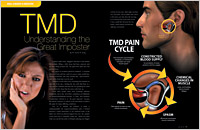Frequent headaches, facial pain, or jaw pain, are all signs of a Temporomandibular Joint Disorder (TMD). Dr. William Harper is one of the few dentists in the Hampton Roads area with the training and experience to treat this complex condition. A significant portion of his post-graduate training has been focused on diagnosing and treating TMJ disorders.
What Is TMJ?
TMJ stands for Temporomandibular Joint, the small joint located in front of your ears that controls the opening and closing of the mouth. TMJ is also used as a general term to describe Temporomandibular Disorder, a condition in which the jaw joints or teeth do not fit together properly.
When the teeth aren’t properly aligned, and the temporomandibular joints (TMJ) don’t operate smoothly, it can create tension, pressure, and ultimately pain in the face, head, shoulders, and neck. In almost all cases, a TMJ disorder will cause tooth wear and may contribute to tooth decay (cavities) and/or periodontal (gum) disease.
Common Symptoms Of TMJ Disorder
- Frequent headaches, often occurring in the morning
- Pain in the shoulders, neck, or face
- Clicking or popping when opening or closing the jaw
- Limited range of motion in the jaw joints or locked jaw
- Teeth grinding or clenching, often accompanied by tooth wear
- Chronic earaches without infection
- TMJ Therapy And Bite Correction
When you visit First Light Dental of Coastal Virginia, you will receive a comprehensive examination that includes an occlusal analysis to study the way your teeth make contact. Using study models of your mouth, Dr. Harper can target the source of dysfunction and create a personalized treatment plan to bring your occlusion back into harmony.
Treatment Options
Dr. Harper has incorporated some of the latest dental technologies into his Poquoson dentist’s office to enable him to offer more accurate treatment and diagnosis of bite disorders such as TMJ.
Occlusal Equilibration
Known as bite correction therapy, this treatment option will bring the teeth into proper contact, allowing the jaw to open and close in its proper position and eliminating stress on the joints and resulting pain. The dentist will make a series of adjustments which may include:
- Reshaping teeth – removing tooth structure, using dental crowns or porcelain veneers
- Repositioning teeth often through orthodontic treatment
- Replacing teeth using dental implants, bridgework or dentures
TMJ Mouth Guard:
A custom mouth guard or dental splint may be used to alleviate specific symptoms, such as teeth grinding. Oftentimes, the mouth guard or splint is used early in treatment and is not needed as a long-term solution. A dental split can be helpful to help identify a comfortable and stable bite position.
Related TMJ/TMD Articles
 TMD – The Great Impostor
TMD – The Great Impostor
This “chameleon” of dental disorders manifests in various ways, including joint pain, sinusitis, ear pain, tooth, and headaches. The causes of TMD, its signs and symptoms, and what can be done to treat this common disorder… Read Article
 Seeking Relief From TMD
Seeking Relief From TMD
TMD, or Temporomandibular Disorders, is an umbrella term for various painful conditions that affect the jaw joints. There are different treatment approaches to TMD problems, but not all are based on science. It’s important to be up on the latest information and to be an educated consumer. In this comprehensive article, Dear Doctor provides state-of-the-art information and guidance on what you should know, whom you should see, and what you should ask… Read Article

